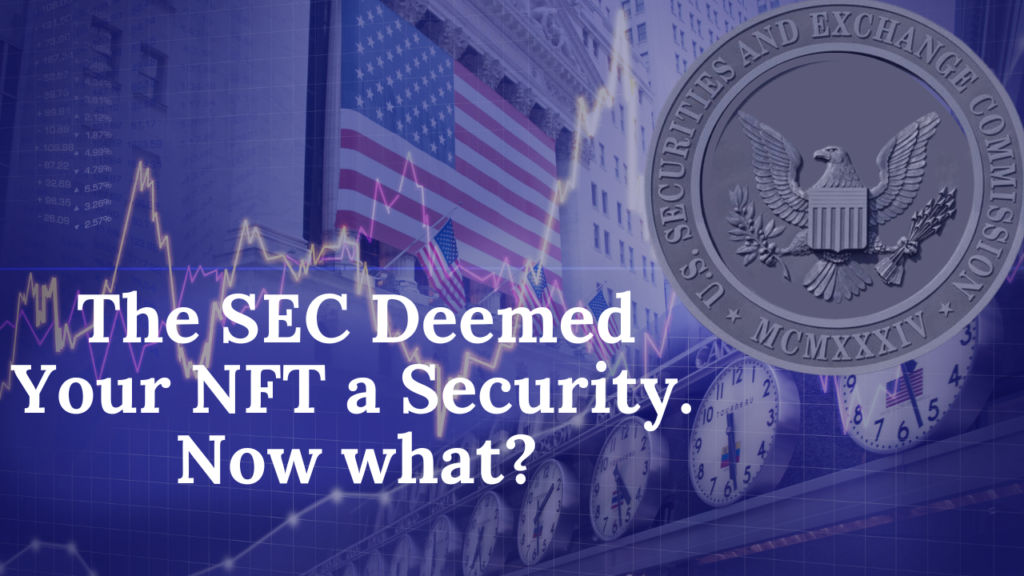
Last Thursday, three individuals were charged with insider trading in an enforcement action by the Securities and Exchange Commission (SEC). What makes this enforcement action unique is that for the first time, the Commission has determined that a crypto asset, previously treated as a commodity, should now be handled as a “Crypto Asset Security.” This recategorizing means that the full complex of securities regulations applies to current and future issuers of existing digital assets, tokens, or NFTs. But what if you’ve already issued these tokens? What can you do to bring your securities into compliance?
As many followers of this asset class will recall, we’ve been here before. In July 2017, the SEC issued its DAO Report of Investigation. The SEC cautioned that initial coin offerings (“ICOs”) could be securities offerings. In 2018 people were raising funds through ICOs. On November 16, 2018, the Securities and Exchange Commission (“SEC”) announced settlements with two companies that had raised funds through such offerings, which allegedly were neither registered nor exempt from registration under federal securities laws. Those cases mark the first time the SEC has imposed civil penalties in connection with ICOs and introduced a novel method for redressing unregistered, non-exempt offerings under federal securities laws.
So, what did these companies have to do to rectify things with the SEC? In both cases, the companies agreed to:
- Conduct a rescission offer
- Pay token purchasers who submitted a claim
- Register the tokens or qualify for an exemption from securities registration
- Maintain their registration
- Timely file all required periodic reports
- And pay a civil penalty of $250,000
According to a Co-Director of the SEC’s Enforcement Division, the settlements provided “a model for companies that have issued tokens in ICOs and seek to comply with the federal securities laws.” These actions outlined a new path forward for companies that issued digital tokens in the good faith belief that their ICOs did not need to be registered or exempt but have since concluded that such prior view was mistaken.
Fast forward to the SEC’s recent enforcement action. If you pay attention to the SEC’s website and the speeches by Chair Gensler, you can see that foreshadowing goes back several months. So, we were not surprised by the Commission’s enforcement action last week. In the complaint, they identify at least nine crypto assets that are securities. Using the Howey test, they show how each asset is a security by satisfying the four criteria below:
- An investment of money (i.e., the sale of digital assets)
- In a common enterprise (i.e., the asset itself)
- With the expectation of profit (i.e., the potential for appreciation on a trading platform)
- To be derived from the efforts of others (i.e., reliance on others to develop and maintain the enterprise)
Given this, all current NFT issuers should evaluate with legal counsel the facts and circumstances applicable to their NFT, their appetite for registering securities and becoming subject to periodic reporting requirements (similar to other public companies), and what steps would be necessary for jurisdictions applicable to such issuer.
The viability of this approach for many NFT issuers may hinge on the issuer’s resources and how “the amount due under Section 12(a) of the Securities Act” is calculated. Keep in mind, it doesn’t eliminate all the risks. Of course, you could do nothing, and hope investors and securities law regulators fail to assert claims before claims became barred by statute limitations. However, if you choose this path, things may become much worse for you.
As for Openseas, Coinbase, and other trading platforms, you may be next. Stay tuned to see if/when the SEC charges these crypto asset trading platforms as operating unregistered securities exchanges. If so, they too may be forced to register as an exchange or alternative trading system.
To conclude, last week’s enforcement action settles a question that has been the subject of genuine debate and points to the conclusion that, indeed, many NFTs involve securities offerings and, accordingly, must either be registered or exempt from registration under the Securities Act of 1933. This will slow the market down as existing issuers and trading platforms seek to comply. However, new NFT issuers can get ahead of the market like CryptoPunk #543, and CryptoPunk #2142 did. They worked with brokers like Dalmore Group, which can assist with the sale of the NFT via an exemption from registration, GUARDD, which can help with state Blue Sky compliance necessary for trading, and PPEX, which can host the trading. Follow this path, and not only will you be exempt from registration, but you will also be compliant with state securities laws that govern secondary trading. You may just yet realize the full potential of your NFT.
For more information email sneiss@guardd.com.
